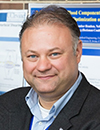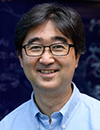| Conferences > Innovations in Microfluidics 2024: Rapid Prototyping, 3D-Printing > Keynote Speakers |
| Register | Login |
Amar BasuProfessor, Electrical and Computer Engineering, Wayne State University Amar Basu, Ph.D. is a professor of Electrical and Computer Engineering, with a joint appointment in Biomedical Engineering at Wayne State University. He received the M.S.E. and Ph.D. degrees in Electrical Engineering (Circuits and Microsystems) and the M.S. degree in Biotechnology from the University of Michigan Ann Arbor. Upon graduation, he joined Wayne State University, where he is PI of the Microfluidics and Bioinstrumentation Lab, and director of the Wayne State Nanofabrication Facility. His overall research interests are in building translatable lab-on-a-chip and microelectronic systems for biotech and biomedicine. One trajectory of work is in multiphase microfluidic systems, including droplet-based digital assays, particle and cell sorting, novel sensing methods using interfacial phenomena, and computer vision applied to cytometry. Another trajectory includes wearable sensors for health monitoring, and portable systems for environmental monitoring. He is the lead PI for a grant that will acquire one of the first industry-scale 2 photon nanoscale 3d printing system to North America. |
Mark BurnsT. C. Chang Professor of Engineering, University of Michigan Prof. Mark A. Burns is the T. C. Chang Professor of Engineering and a Professor in both Chemical Engineering and Biomedical Engineering at the University of Michigan. He obtained his MS and PhD degrees in Chemical and Biochemical Engineering from the University of Pennsylvania, and his BS degree from the University of Notre Dame. Prof. Burns has over 350 publications, patents, and presentations. He is a Fellow of the National Academy of Inventors, the American Institute for Chemical Engineers, and the American Institute for Medical and Biological Engineering. He has won numerous awards including the Food, Pharmaceutical, and Bioengineering Division Award from AIChE, and both a Teaching Excellence Award and a Research Excellence Award from the College of Engineering at the University of Michigan. He has also served in a variety of administrative positions at Michigan including Chair of the Chemical Engineering Department, Advisor to the Dean of Engineering, and Executive Director of Mcubed and Research Innovation in the Office of the Vice President for Research. |
Jianping FuProfessor, Mechanical Engineering, Biomedical Engineering, Cell & Developmental Biology, University of Michigan-Ann Arbor Dr. Jianping Fu is a Professor of Mechanical Engineering, Biomedical Engineering, and Cell & Developmental Biology at the University of Michigan. Dr. Fu’s research focuses on stem cell bioengineering, developmental bioengineering, mechanobiology, and microfluidics. Dr. Fu and his co-workers' research has contributed significantly to the emerging field of "Artificial Embryos", which was selected by the MIT Technology Review as “10 Breakthrough Technologies of 2018”. Dr. Fu is the recipient of the NSF CAREER Award, the BMES-CMBE Rising Star Award, the ACS Analytical Chemistry Young Innovator Award, the Alexander von Humboldt Foundation Friedrich Wilhelm Bessel Research Award, and numerous awards from the University of Michigan. Dr. Fu is a Fellow of the American Institute for Medical and Biological Engineering (AIMBE), the Royal Society of Chemistry (RSC), the American Society of Mechanical Engineers (ASME), the International Academy of Medical and Biological Engineers (IAMBE), and the Biomedical Engineering Society (BMES). Dr. Fu was a member of the International Society for Stem Cell Research (ISSCR) Guidelines Working Group from 2019 to 2021 and is currently a member of the ISSCR Publications Committee. He is a council member of the Biomedical Engineering Society Cellular and Molecular Bioengineering Special Interest Group (BMES CMBE-SIG). Dr. Fu currently serves as the Associate Editor of npj Regenerative Medicine and is an Editorial or Advisory Board Member of Cell Stem Cell, Biophysical Journal, Cell Regeneration, Mechanobiology in Medicine, and Frontiers in Cell and Developmental Biology. Additionally, Dr. Fu is a Founding Member of the Catalysts Program of EMBO Journal. |
Bonnie GrayProfessor of Engineering Science, Simon Fraser University Dr. Bonnie L. Gray is a Professor in the School of Engineering Science (ENSC) at Simon Fraser University (SFU) in Canada, a Fraser Health Authority affiliated researcher, and on the board of the Vancouver Medical Device Development Center (MDDC). Dr. Gray has over 140 peer-reviewed journal and conference publications, and has given more than 25 invited, keynote, and plenary presentations at international conferences, in the areas of novel materials and fabrication techniques for biomedical and microfluidic devices and systems; development of flexible and wearable microfluidic and biosensor technologies; point-of-care instruments; and chip-based biological cell sorting and trapping methods. Dr. Gray is a dedicated mentor and the 2014 recipient of the SFU Dean of Graduate Studies Award for Excellence in Supervision. Dr. Gray was the Chapter Chair for the Vancouver IEEE Electron Devices Society (EDS) from 2007-2017, and organizer of two mini-colloquia in 2012 and 2017. She is on the Editorial Board of the IOP Journal of Micromechanics and Microengineering. She chaired the SPIE Conference on Microfluidics, BioMEMS, & Medical Microsystems from 2014-2024, and has been a member of the Program and/or Organizing Committees for various IEEE conferences, including the IEEE MEMS Conference, the IEEE Nanotechnology Materials and Devices Conference (NMDC), and IEEE NANO. She is also active in IEEE awards committees (IEEE NTC and IEEE EMBS); and EDI initiatives, including the IEEE Women in Electron Devices Committee (WiEDS) and a member of Women of Wearables (WoW). |
Daniel HayesStuart B. Padnos Professor of Breast Cancer Research, University of Michigan Rogel Cancer Center Dr. Hayes received undergraduate, master’s and medical degrees from Indiana University, followed by a residency in internal medicine at the University of Texas Southwestern Medical School/Health Science Center/Parkland Memorial Hospital and a fellowship in medical oncology at Harvard’s Dana Farber Cancer Institute (DFCI). He has led the breast cancer programs at DFCI (1991-1996), Georgetown University’s Lombardi Cancer Center (1996-2001), and the University of Michigan from 2001-2016. Dr. Hayes’ research interests are in the field of experimental therapeutics and cancer biomarkers, especially in breast cancer. His work has been particularly focused on development and validation of cancer biomarker tests, such as HER-2, CA15-3, circulating tumor cells and pharmacogenomic markers. He has been instrumental in establishing international guidelines for the use of tumor biomarker tests, including criteria for their clinical utility. He has served as chair of the SWOG Breast Cancer Translational Medicine Committee, and he was an inaugural member and chaired the American Society of Clinical Oncology (ASCO) Tumor Marker Guidelines Committee. He has been instrumental in the joint ad hoc committees between ASCO and the College of American Pathologists. Dr. Hayes served on the ASCO Board of Directors, and served a 3 year term as President of ASCO from 2016-2018. He is a Fellow of ASCO, a Fellow of the American College of Physicians, a past Komen Scholar, and a member of the Association of American Physicians and of the American Clinical and Climatologic Association. He has been the recipient of the ASCO Gianni Bonadonna Award in breast cancer and the Allen Lichter Visionary Leadership Award in 2021 as well as the Susan G. Komen Brinker Award for Scientific Distinction in Clinical Research in 2023, and has received the Distinguished Alumni Award from the Indiana University Medical School (2024). |
David JunckerProfessor and Chair, McGill University David Juncker stayed as a visiting scientist at the National Metrology Institute of Japan in Tsukuba from 1997-98. He conducted his PhD research at the IBM Zurich Research Laboratory from 1999-2002. He then pursued his studies as a Post-doc first at IBM Zurich until 2004, and then one year at the Swiss Federal Institute of Technology in Zurich (ETH). David started as an assistant professor in the Biomedical Engineering Department of McGill University in 2005, was promoted to associate professor with tenure in 2011, and became a full professor in 2016. As of early 2018, David serves as departmental chair of the Biomedical Engineering Department at McGill University. |
Leanna LevineFounder & CEO, ALine, Inc. Dr. Levine, founder of ALine, Inc., is an entrepreneur, technologist, and inventor. She has a unique blend of technical expertise in both bioanalytical science and manufacturing process development. Prior to founding ALine, Dr. Levine developed bioanalytical technology to support life science research. While at Monsanto, her lab led the industry in the application of fluorescence polarization for high throughput screening for novel therapeutics. In 1998 she joined Spectrum Laboratories as Director of Hollow Fiber Manufacture and Product Development. Dr. Levine earned her Ph.D. at Washington University, St. Louis, MO , and her B.S. in Biochemistry and BA in German from the University of Missouri, Columbia, MO. In 2003 she was a visiting scholar at the UCLA Anderson School of Business. In 2000 she was the chair of the Gordon Conference on Bioanalytical Sensors. She is the co-author on a dozen publications, and several patents. |
Noah MalmstadtProfessor, Mork Family Dept. of Chemical Engineering & Materials Science, University of Southern California Noah Malmstadt is Professor at the University of Southern California. He received a BS in Chemical Engineering from Caltech and a PhD in Bioengineering from the University of Washington. Following postdoctoral work at UCLA, he joined the Mork Family Department of Chemical Engineering and Materials Science at USC in 2007. Malmstadt is the recipient of a 2012 Office of Naval Research Young Investigator award. His research focuses on microfluidic strategies to facilitate material fabrication and biophysical analysis. He has pioneered the integration of ionic liquids as solvents in droplet microreactors and the application of microfluidic systems to synthesizing biomimetic cell membranes. Microfluidic analytical techniques he has developed include methods for measuring the permeability of cell membranes to druglike molecules and techniques for measuring ionic currents through membrane proteins. |
Gregory NordinProfessor, Brigham Young University Professor Greg Nordin joined the faculty of the Electrical & Computer Engineering Department at Brigham Young University in 2005. From 1992 to 2005 he was at The University of Alabama in Huntsville (UAH) where he was the founding director of the university's Nano and Micro Devices Center, which was created as an independent research center by the University of Alabama System Board of Trustees. While director of the center, he created a 7,600 sq. ft. cleanroom facility for nano and microfabricated devices to pursue research activities in photonics, MEMS, microfluidics, and sensors. Prof. Nordin has led numerous large research programs, and has been principal investigator on research grants from government and industry totaling $18M. He is the recipient of the National Science Foundation CAREER award (1996) for promising young faculty, and twice received the UAH Outstanding Researcher Award as well as the UAH Foundation Award for Research and Creative Achievement. Prof. Nordin's current research is focused on developing 3D printing for microfluidic devices and applications. In March 2018 Prof. Nordin gave a TED talk on his group's work, which is available at https://www.youtube.com/watch?v=T122fzOEVYE. |
Ian PapautskyRichard and Loan Hill Professor of Bioengineering, Co-Director, NSF Center for Advanced Design & Manufacturing of Integrated Microfluidics, University of Illinois at Chicago Ian Papautsky is the Richard and Loan Hill Professor in the biomedical engineering department. His lab focuses on using microfluidics to innovate blood analysis. Papautsky was one of the pioneers of the inertial microfluidics technology for label-free isolation and analysis of rare cells. His recent work has focused on applying this approach to the fractionation of blood, as well as capture and subsequent molecular profile analysis of circulating tumor cells for liquid biopsy. Papautsky is also co-director of the National Science Foundation Center for Advanced Design and Manufacturing of Integrated Microfluidics, an industry-university collaborative research center that fosters interactions between academics and businesses in the areas of medical devices, pharmacology, and precision agriculture. Papautsky joined the University of Illinois Chicago in 2016. He has been recognized with many awards and honors, including Ohio Bioscience 30 in Their 30s. He is fellow of the AIMBE and the RSC. |
Ryan SocholAssociate Professor, University of Maryland, College Park Prof. Ryan D. Sochol is an Associate Professor of Mechanical Engineering within the A. James Clark School of Engineering at the University of Maryland, College Park (UMD). Prof. Sochol received his B.S. from Northwestern University, and both his M.S. and Ph.D. from the University of California, Berkeley. Prior to joining the faculty at UMD, Prof. Sochol served as: (i) an NIH Postdoctoral Trainee within the Harvard-MIT Division of Health Sciences & Technology, Harvard Medical School, and Brigham & Women’s Hospital, (ii) Director of the Micro Mechanical Methods for Biology (M3B) Laboratory Program within the Berkeley Sensor & Actuator Center at UC Berkeley, and (iii) a Visiting Postdoctoral Fellow at the University of Tokyo. In 2019, Prof. Sochol was elected Co-President of the Mid-Atlantic Micro/Nano Alliance. His group received IEEE MEMS Outstanding Student Paper Awards in both 2019 and 2021 and the Springer Nature Best Paper Award (Runner-Up) in 2022. Prof. Sochol received the NSF CAREER Award in 2020 and the Early Career Award from the IOP Journal of Micromechanics and Microengineering in 2021, and was recently honored as an inaugural Rising Star by the journal, Advanced Materials Technologies, in 2023. |
Shuichi TakayamaProfessor, Georgia Research Alliance Eminent Scholar, and Price Gilbert, Jr. Chair in Regenerative Engineering and Medicine Wallace H. Coulter Department of Biomedical Engineering, Georgia Institute of Technology & Emory University School of Medicine Prof. Shuichi Takayama’s research interests started with bioorganic synthesis at the University of Tokyo and Scripps Research Institute. Subsequently he pursued postdoctoral studies in bioengineered microsystems at Harvard University as a Leukemia and Lymphoma Society Fellow. He spent 17 years at the University of Michigan in the Biomedical Engineering Department and Macromolecular Science and Engineering Program, then moved to the Wallace H. Coulter Department of Biomedical Engineering at the Georgia Institute of Technology and Emory School of Medicine in the summer of 2017. He is an associate editor of Integrative Biology and recipient of the Pioneers of Miniaturization Prize. |




